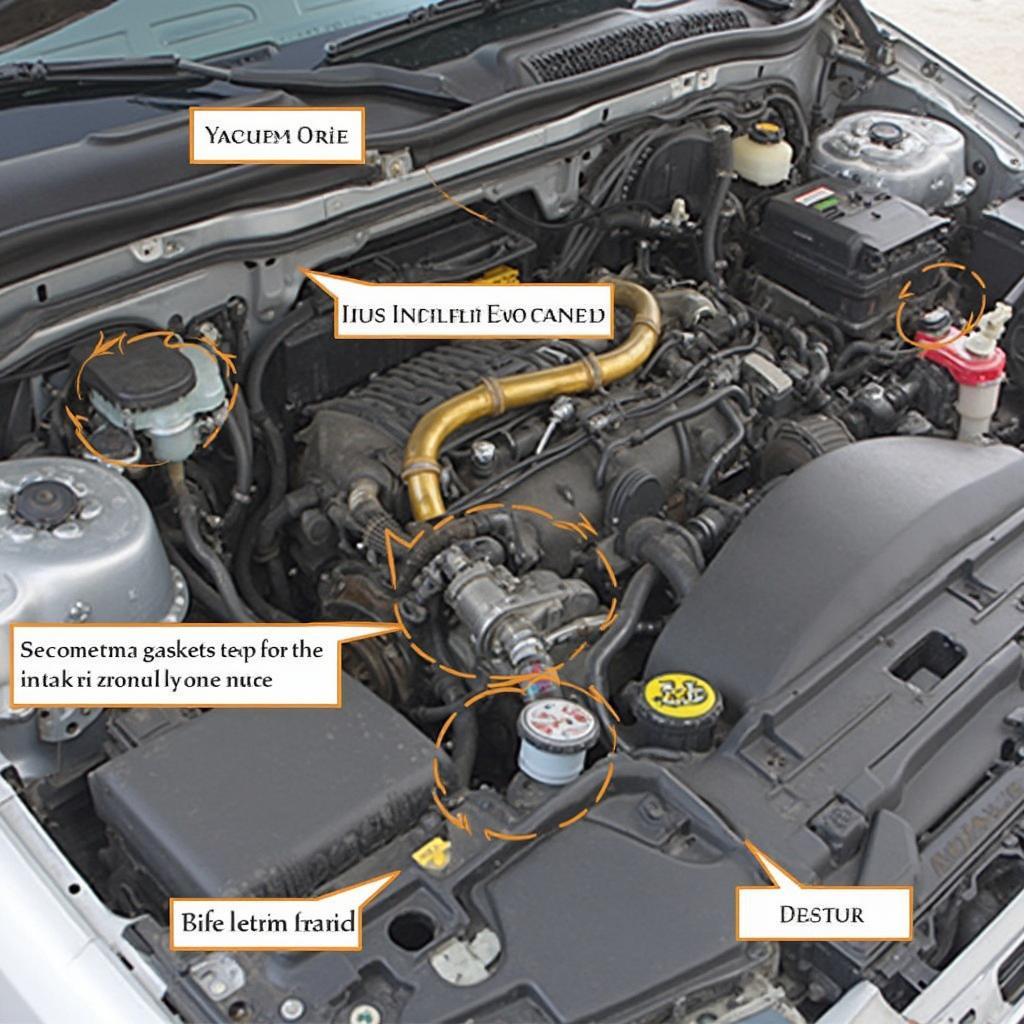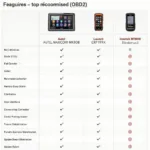The dreaded P0300 code on your 2001 Ford Explorer Sport can be a real head-scratcher, especially when you’re not experiencing any noticeable drivability problems. This code indicates a random misfire, meaning the engine’s control unit (ECU) has detected misfires across multiple cylinders, but not consistently enough to isolate a single culprit. This article will dive into the common causes of a P0300 code on a 2001 Ford Explorer Sport without noticeable drivability issues, offering diagnostic strategies and solutions.
Understanding the P0300 Code on a 2001 Ford Explorer Sport
The P0300 diagnostic trouble code (DTC) is a general misfire code. While it doesn’t pinpoint a specific cylinder, it’s a crucial warning sign. Even without noticeable symptoms like rough idling, stumbling, or loss of power, ignoring this code can lead to more serious engine damage and decreased fuel efficiency in your 01 Ford Explorer Sport. This guide will help you pinpoint the cause and get your SUV running smoothly again.
Common Causes of P0300 without Drivability Issues
Several factors can contribute to a P0300 code, even in the absence of noticeable driving problems. These include:
- Vacuum Leaks: Small, often undetectable vacuum leaks can disrupt the air-fuel mixture, leading to random misfires.
- Faulty Spark Plugs or Wires: Worn spark plugs or damaged wires can cause intermittent misfires, especially under certain conditions.
- Fuel System Problems: Issues with the fuel pump, fuel filter, or fuel injectors can disrupt the proper delivery of fuel to the cylinders.
- EGR Valve Malfunction: A malfunctioning Exhaust Gas Recirculation (EGR) valve can introduce exhaust gases into the intake manifold at the wrong time, disrupting combustion.
- Mass Airflow Sensor (MAF) Problems: A dirty or faulty MAF sensor can provide inaccurate readings to the ECU, causing the engine to run lean or rich, leading to misfires.
Diagnosing a P0300 on Your 01 Ford Explorer Sport
Diagnosing a P0300 requires a systematic approach:
- Check for Vacuum Leaks: Inspect vacuum hoses for cracks, splits, or loose connections. Use a vacuum gauge or carburetor cleaner to pinpoint leaks.
- Inspect Spark Plugs and Wires: Check for wear, fouling, or damage. If they’re old, replace them as part of regular maintenance.
- Test Fuel Pressure: Use a fuel pressure gauge to ensure the fuel pump is delivering the correct pressure.
- Check the EGR Valve: Inspect the EGR valve for carbon buildup or malfunction. Clean or replace as needed.
- Clean or Replace the MAF Sensor: Clean the MAF sensor with a specialized cleaner. If cleaning doesn’t resolve the issue, consider replacement.
You can find more information about checking your engine codes at check engine obd2 code.
Why a P0300 Can Occur Without Drivability Issues
Sometimes, the misfires are subtle enough that the driver doesn’t perceive any change in performance. However, the ECU is sensitive enough to detect these inconsistencies. This is why using an OBD2 scanner is crucial for early detection and prevention of more significant problems.
“Even without noticeable symptoms, a P0300 code should never be ignored. Early diagnosis and repair can prevent costly repairs down the line,” advises John Smith, ASE Certified Master Technician.
Addressing the P0300 code promptly is essential. Continued driving with misfires can damage the catalytic converter and other engine components.
Conclusion
A P0300 code on a 2001 Ford Explorer Sport, even without drivability issues, warrants immediate attention. By understanding the potential causes and following a systematic diagnostic approach, you can address the problem early and prevent more serious engine damage. Regular maintenance, including spark plug and wire replacement, can also help prevent this issue. You can learn more about this specific issue at 01 ford explorer sport obd2 p0300 with no drivability issues.
FAQ
- Can I drive my car with a P0300 code? While you might not notice significant drivability issues, it’s best to address the issue promptly to prevent potential damage.
- How much does it cost to fix a P0300 code? The cost varies depending on the underlying cause. It could range from a simple spark plug replacement to more complex repairs.
- What are the most common causes of a P0300 code? Vacuum leaks, faulty spark plugs/wires, fuel system problems, EGR valve malfunction, and MAF sensor issues are common culprits.
- Will a P0300 code clear itself? No, the code will remain stored in the ECU until the problem is fixed and the code is cleared with a scanner.
- Can bad gas cause a P0300 code? While rare, contaminated fuel can contribute to misfires.
- How can I prevent a P0300 code? Regular maintenance, including timely spark plug and wire replacement, can help prevent this issue.
- Is a P0300 code serious? While not immediately catastrophic, ignoring a P0300 can lead to more serious and expensive engine problems.
“Regular preventative maintenance is the best way to avoid these types of issues,” states Maria Garcia, Automotive Engineer.
Common Scenarios for P0300 Code Without Drivability Issues
- Scenario 1: The car starts and runs smoothly, but the check engine light is on with a P0300 code.
- Scenario 2: Slight hesitation during acceleration, barely noticeable, accompanied by a P0300 code.
- Scenario 3: Fuel economy slightly decreased, with a stored P0300 code.
Related Articles and Questions
- How to use an OBD2 scanner effectively?
- What are the other common Ford Explorer OBD2 codes?
Need Help? Contact us via WhatsApp: +1(641)206-8880, Email: [email protected] or visit us at 789 Elm Street, San Francisco, CA 94102, USA. Our customer service team is available 24/7.

